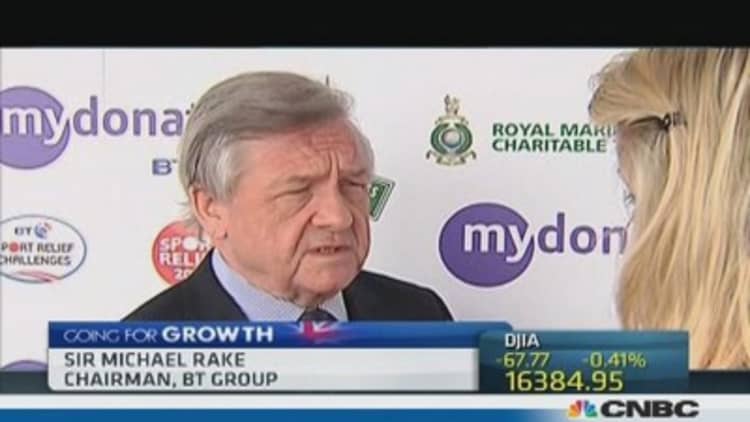The U.K. economy is going to be back to its pre-recession peak this summer, three months earlier than expected, according to predictions from the country's business group, the British Chambers of Commerce.
That would appear good news—but there are still a wide range of concerns about the quality and strength of the U.K recovery.
"It would be highly unusual if the U.K. didn't return to its long-term growth pattern," Simon Wren-Lewis, an economics professor at Oxford University and former Treasury official, pointed out.
"This is a recovery based on consumers saving less—and that can't go on for that long."
(Read more: UK economy: What five years of 0.5% interest rates has done)
Many of the key economic datapoints suggest an improved picture: the U.K.'s economy is showing improved growth of 2-3 percent expected in 2014, up from last year's 1.8 percent. House prices have proved to be surprisingly resilient, fuelled by low interest rates and schemes to boost lending. Meanwhile, unemployment is back down to nearly 7 percent.
"Real wage growth and productivity are picking up, and unemployment is falling. All this should drive positive consumer sentiment," Rob Wood, chief U.K. economist at Berenberg, told CNBC.
"The fundamental driver, which is monetary policy, started working, mainly following Mario Draghi's words on saving the euro."

The U.K. is currently undervalued by credit markets relative to its economic fundamentals, according to Alan Capper, head of credit strategy at Lloyds Banking Group. He forecasts a boost to UK credit later this year when investors realize that European markets are not as secure as hoped.
"It seems as though investors are just so bullish about the overall environment that they are almost lulled into a false sense of security," he said.
(Read more: UK economy hit to 'absolute core' by floods)
However, the picture is not uniformly rosy. There are also growing concerns about a house price bubble in London. While London real estate is currently perceived as a safe haven and is attracting international investment, this could lead to "excess valuations" according to Bank of America Merrill Lynch strategists.
(Read more: UK house prices: bubble alert?)
There are also increasing concerns about domestic U.K. political risks, chiefly a "Yes" vote for Scottish independence, or a better-than-expected result for anti-European Union party the UK Independence Party (UKIP) in May's European elections.
A closer look at the country's workforce figures reveals that job security has not returned to the UK. Nearly 583,000 workers took on controversial "zero hours contracts," where they are not guaranteed a certain number of hours work, last year – more than double U.K. government estimates. These contracts make hiring easier, but also put the worker at increased risk of a fluctuating income.
And youth unemployment continues to be a concern.
Healthier business investment or foreign trade figures are needed for a stronger recovery, according to Wren-Lewis.
(Read more: UK economy: Business investment rises)
The two may go hand-in-hand, he argued.
"If you want to expand into overseas markets, bank finance has to be there. One of the worrying things is that we haven't seen that pick up in lending to SMEs yet," he said.
"This all goes back to the issue of to what extent the U.K. banking sector is fundamentally broken."
—By CNBC's Catherine Boyle. Follow her on Twitter @cboylecnbc.


